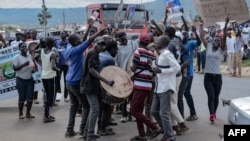In the capital here, the race for the post of governor has taken an unexpected turn thanks to ruling party candidate Polycarp Igathe.
A former top bank executive, Igathe is a familiar face to Nairobians, who elected him deputy governor in 2017.
The 49-year-old resigned in 2020 over disagreements with his boss, the scandal-hit Mike Sonko.
Since then, he has made a no-holds-barred bid to win the governorship, doing everything from cleaning public toilets and washing cars to selling chapatis (an Indian flatbread) in the street.
The unusual campaign has prompted a torrent of comments on social media, occasionally enthusiastic, but more often making a joke at Igathe's expense.
"Nairobians beware there is somebody known as Polycarp Igathe he can easily walk into your house as early as 5am to cook breakfast for you and even wash your utensils," one Twitter user wrote.
"He is accompanied by 10 camera men and security. So don't confuse them with THIEVES."
Another Twitter user joked: "I plan to go to the salon tomorrow; why am I telling you this? I'm just putting it out there in case Polycarp Igathe is on shampoo duty."
The candidate is unfazed.
"The way I have designed my campaign, my first phase was to ground myself and root myself in Nairobians' day-to-day lives," he told The Standard newspaper in May.
For those less inclined to get their hands dirty, funerals have become a key staging ground for stump speeches, offering a captive audience.
The practice dates back decades, with funerals providing a rare opportunity for people to gather and speak freely during the 1978-2002 rule of autocratic president Daniel arap Moi.
"Campaigning in funerals has become a culture," political analyst Nerima Wako-Ojiwa told AFP.
"A funeral is where you find a lot of people present, a ready public. You just show up and talk, it's easy."
When former president Mwai Kibaki died in April, the two leading presidential candidates Raila Odinga and William Ruto used his funeral to advertise their credentials.
On August 9, 22.1 million Kenyans will elect hundreds of representatives, including senators, governors, MPs and the East African nation's next president.
Six elections will be held, capping a campaign blitz that has punctuated the life of the country for several months.









